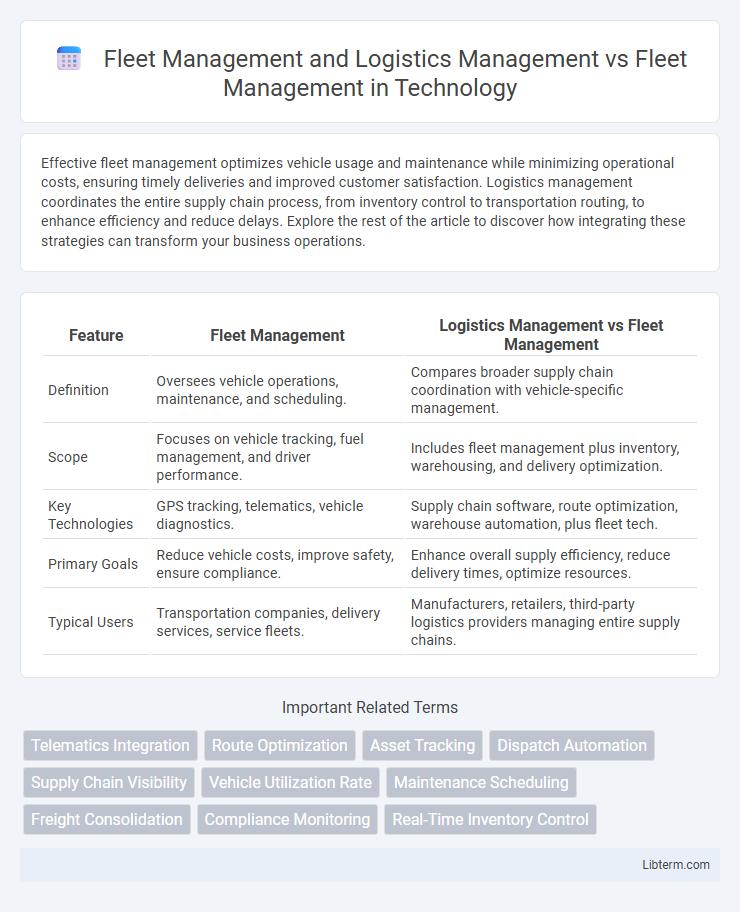Effective fleet management optimizes vehicle usage and maintenance while minimizing operational costs, ensuring timely deliveries and improved customer satisfaction. Logistics management coordinates the entire supply chain process, from inventory control to transportation routing, to enhance efficiency and reduce delays. Explore the rest of the article to discover how integrating these strategies can transform your business operations.
Table of Comparison
| Feature | Fleet Management | Logistics Management vs Fleet Management |
|---|---|---|
| Definition | Oversees vehicle operations, maintenance, and scheduling. | Compares broader supply chain coordination with vehicle-specific management. |
| Scope | Focuses on vehicle tracking, fuel management, and driver performance. | Includes fleet management plus inventory, warehousing, and delivery optimization. |
| Key Technologies | GPS tracking, telematics, vehicle diagnostics. | Supply chain software, route optimization, warehouse automation, plus fleet tech. |
| Primary Goals | Reduce vehicle costs, improve safety, ensure compliance. | Enhance overall supply efficiency, reduce delivery times, optimize resources. |
| Typical Users | Transportation companies, delivery services, service fleets. | Manufacturers, retailers, third-party logistics providers managing entire supply chains. |
Understanding Fleet Management
Understanding Fleet Management involves overseeing a company's vehicle fleet to optimize efficiency, reduce costs, and ensure compliance with regulations. Fleet Management focuses on vehicle maintenance, driver management, fuel consumption, and route planning, whereas Logistics Management encompasses broader supply chain functions like inventory control and transportation coordination. Effective Fleet Management integrates technology such as GPS tracking and telematics to enhance operational visibility and decision-making.
Defining Logistics Management
Logistics management involves overseeing the entire supply chain process, including procurement, transportation, storage, and delivery, ensuring efficient flow of goods from origin to destination. Unlike fleet management, which specifically focuses on maintaining and operating a company's vehicle fleet, logistics management encompasses broader strategic planning and coordination of resources to meet customer demands. Effective logistics management integrates inventory control, order fulfillment, and transportation optimization to reduce costs and improve service levels.
Key Differences Between Fleet and Logistics Management
Fleet management focuses primarily on overseeing vehicle operations, maintenance, and compliance to ensure efficient transportation and cost control within an organization. Logistics management encompasses a broader scope including planning, implementing, and controlling the movement and storage of goods, inventory management, and supply chain coordination. Key differences lie in fleet management's vehicle-centric approach versus logistics management's comprehensive focus on the entire supply chain process and distribution network.
Core Functions of Fleet Management
Fleet management focuses on optimizing vehicle operations through core functions such as maintenance scheduling, fuel management, driver performance monitoring, and route planning to reduce costs and improve efficiency. Logistics management encompasses broader supply chain processes, including inventory control, warehousing, and order fulfillment, integrating fleet management as one component. Effective fleet management ensures vehicle reliability and compliance, directly impacting overall logistics performance and delivery timelines.
Logistics Management: Scope and Responsibilities
Logistics management encompasses the planning, implementation, and control of efficient transportation and storage of goods from origin to consumption, involving inventory management, warehousing, order fulfillment, and supply chain coordination. Fleet management focuses primarily on the operational aspects of managing company vehicles, including maintenance, routing, driver management, and compliance. Logistics management has a broader scope, integrating fleet management as one component within the larger framework of supply chain optimization and customer service enhancement.
Fleet Management vs Logistics Management: Comparative Analysis
Fleet management primarily focuses on the efficient operation, maintenance, and tracking of a company's vehicle fleet, including aspects such as vehicle acquisition, fuel management, and driver performance monitoring. Logistics management encompasses a broader scope, involving the planning, implementation, and control of the movement and storage of goods, services, and related information from origin to consumption. Comparing fleet management and logistics management highlights that while fleet management is a component of logistics, logistics management integrates multiple processes like inventory control, warehousing, and supply chain coordination beyond just vehicle oversight.
Integrating Fleet Management Into Logistics Operations
Integrating Fleet Management into Logistics Operations enhances operational efficiency by synchronizing vehicle tracking, route optimization, and delivery scheduling within the broader supply chain framework. This integration leverages telematics data and real-time analytics to reduce fuel consumption, improve asset utilization, and minimize delivery delays, directly impacting logistics performance metrics. Effective fusion of these systems supports end-to-end visibility and strategic decision-making crucial for meeting customer demands and maintaining competitive advantage in logistics management.
Technology in Fleet and Logistics Management
Fleet and Logistics Management leverage advanced technologies such as GPS tracking, telematics, and AI-driven route optimization to enhance operational efficiency, reduce fuel consumption, and improve delivery accuracy. Fleet Management primarily focuses on vehicle maintenance, driver performance, and compliance using digital platforms, while integrated Logistics Management encompasses supply chain coordination, inventory control, and real-time data analytics for end-to-end process visibility. Innovations like IoT sensors and blockchain in Fleet and Logistics Management provide seamless asset tracking and secure data sharing, driving smarter decision-making across transportation networks.
Benefits of Distinguishing Fleet from Logistics Management
Distinguishing fleet management from logistics management allows organizations to optimize operations by focusing on specialized tasks such as vehicle maintenance, driver scheduling, and fuel management within fleet management, while logistics management concentrates on supply chain planning, inventory control, and distribution strategies. This separation enhances resource allocation, improves operational efficiency, and reduces costs by enabling targeted technology solutions like GPS tracking for fleets and advanced analytics for logistics. Clear delineation between both functions supports compliance with regulatory standards and improves overall service delivery in transportation and supply chain operations.
Future Trends in Fleet and Logistics Management
Future trends in fleet and logistics management emphasize the integration of AI-powered analytics to optimize route planning and reduce fuel consumption, enhancing overall operational efficiency. Advanced telematics and IoT devices enable real-time tracking and predictive maintenance, minimizing downtime and improving asset utilization. Embracing autonomous vehicles and electrification further transforms fleet management, driving sustainability and cost savings in logistics operations.
Fleet Management and Logistics Management Infographic

 libterm.com
libterm.com